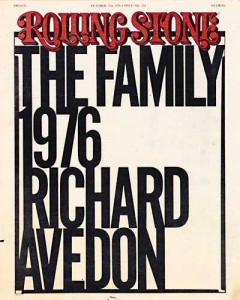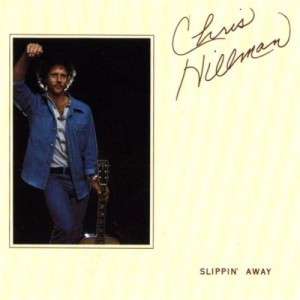Chris Hillman Slips Away…
Cameron talks with Chris Hillman on the cusp of his first solo album, Slippin’ Away. They chat about his long career with such legendary acts as The Byrds, The Flying Burrito Brothers and much more.

Chris Hillman: Early Byrd Finds His Wings
Los Angeles – The laundry attendant at Holloway Cleaners was amazed. “You’re Chris Hillman, aren’t you? What are you doing here?” In another 15 minutes, Hillman was scheduled to make his Los Angeles solo debut at the Roxy nightclub down the street. He handed over his claim check. “I can’t go to work in a dirty shirt,” he said.
Chris Hillman’s use of the word “work” should never be taken as an antimusic remark. He does not fashion himself an archetypal rock star, riding in limousines and worrying of nothing but art. Ever since his too-much, too-soon days as bassist/guitarist with the Byrds, Hillman has demanded none of the luxuries of his trade. “fuck all that other stuff,” he laughs.
Now 31, Hillman has made his reputation by staying out of West Coast music spotlights. Whether with the Byrds or as a founding member of the Flying Burrito Brothers, Manassas and the Souther-Hillman-Furay Band, he has been most content as the lurking accomplice.
Few even know of his discoveries. Hillman was one of the earliest supporters of the Buffalo Springfield, arranging for their first auspicious break as house band at the Whisky-A-Go-Go. It was even Hillman who brought fellow Byrd David Crosby over for a first look at the band that featured Crosby’s future partners, Steve Stills and Neil Young. (Crosby’s reaction: “Aww, I don’t like ’em.”) Years later, he stumbled onto Emmylou Harris – then a shy Joni Mitchell-esque folk singer – in a Washington D.C. nightclub. “I wanted to sing with her, but I was too wrapped up in Manassas.” Instead, he convinced Gram Parsons to give her a call. More recently, he helped his former backing band – now called Firewall – record the demos that led to their contract. “Look at me,” Hillman likes to joke, “look at what I get for helping everybody out. A cult. I should recut ‘Mr Tambourine Man’ disco.”
Raised in the rural outskirts of San Diego, Hillman grew up in a strictly country & western household. He learned the bluegrass mandolin and spent several hard years on the country bar circuit. Then, to make some money for a change, Hillman went to work for Randy Sparks, who also employed John Denver. Hillman does not revel in the memory. “I was starving,” he says, “so don’t hold it against me.”
He didn’t work for Sparks long. When a friend, L.A. record producer Jim Dickson, told Chris about three determined folkies he was taping on his home recorder, Hillman followed the lead. Gene Clark, David Crosby and Jim (not yet Roger) McGuinn were impressive and, sure enough, Hillman volunteered his services as their bassist. He had never played the instrument before. “I learned quick,” Hillman remembers.
They became the Byrds, and their long and turbulent story, says Hillman, was steeped in rock. “We were really copying the Beatles in a lot of ways. Originally, when ‘Mr. Tambourine Man’ was presented to the group, we all hated it. It wasn’t funky enough. But we finally worked it up and there it was . . . We tried playing a folk song with all these brand-new electric instruments, that we’d just gotten . . . and it sounded completely different. What a rush.”
But . . . “we were young. As soon as we started to make it, we didn’t give a shit. We’d go out onstage all stoned out, you know, and stand there like statues and play. Still, there definitely were times when we’d get up onstage and steam. The Byrds and super-stardom at 21 . . . it was one of those things that if you survive, you learn. A lot of people end up as casualties, burnt out. You gotta make it through and learn . . . “
Hillman remained with the Byrds until shortly after their classic country-rock experiment, Sweetheart of the Rodeo. “The Byrds,” he says, “weren’t happening around that time.”
He and Gram Parsons, who had ended his brief stay with the Byrds three months before, started a band that would take where Sweetheart left off. The sad story of the Flying Burrito Brothers, though, is that they were always far, far ahead of the their time. “We had always hoped the band would become as successful as the Byrds were, but it never happened. We never had a hit single . . . just a lot of ups and downs. It was a magical, very productive period in my life. But nobody was really ready for us. Now, even the new Flying Burrito Brothers are doing all right. I do really suspect their motive, though. It’s like me hiring four other guys and calling myself the Byrds. My point, though, is what we were doing is real popular now. For God’s sake, I watch these groups with their rhinestone suits on, singing out of tune, playing shitty, and they’re being accepted. It breaks my heart.
“We all worked so hard with that band. Goddamn it, we deserved success.”
Like most bands in their position, the Flying Burrito Brothers splintered out of desperation. Hillman was helping Stephen Stills with his third solo album at the time of the final breakup. When Stills promptly offered him a partnership in Manassas, it seemed a comfortable solution to post-Burrito depression. “We were always more of a band than people thought,” Hillman recalls fondly. “Stills wouldn’t have been the same without us, that’s for sure. Stills was playing a concert in Cleveland with the Memphis Horns. I was sitting in the audience, going, ‘Jesus Christ. They’re making 25,000 bucks and they’re shitty. The Burritos are better than this.’ “I went backstage,” Hillman chortles, “that’s when we renewed the friendship. Manassas was the best band Stills ever played in.”
Manassas also drifted in various directions. Crosby, Stills, Nash and Young re-formed briefly, and Hillman agreed to help out with a Byrds reunion LP. “It wasn’t done right and I’m disappointed to have ended the Byrds legacy on that crummy a note.”
When Gram Parsons and childhood friend/former Byrds guitarist Clarence White both died during the same three-month period. Hillman was hit even harder. “Towards the end of Gram’s life, he was drinking again and getting a little weird. I always loved Gram – him singing the shit out of ‘Hot Burrito #1’ in the studio is a memory I’ll always have – but I couldn’t deal with him. He was very self-destructive. I know a lot of guys that have had that. There is nothing you can do or say. Subconsciously, they want to kill themselves, and he did. It was a loss and I was upset, but I expected it.
“In all truthfulness, it upset me more when Clarence got killed because I grew up with him. My God, what a drag. He was putting his guitar in the back of a car and gets hit by a drunk. Crazy. Nobody could play guitar like him. Nobody.”
Eventually, Hillman wound up part of then-Asylum Records president David Geffen’s plan to surround singer-songwriter John David Souther with an all-star group. The result, the Souther-Hillman-Furay Band, was one of the strangest failures in rock & roll. By all indications, success was inevitable. Souther is a masterful songwriter in the Eagles mold. Furay’s roots were Buffalo Springfield and Poco, and Hillman’s utilitarian prowess supposedly cinched it.
“But we were awful,” Hillman shrugs. “We we never a band. We barely even knew each other. It had all the good ingredients, but boy, the cake turned out bad. S-H-F was three guys making minisolo albums on each record. The only advantage is that it got all three of our names around.
“For a while there, it looked like S-H-F might have worked out – around the time of our second album, when Tom Dowd was about to produce us. But a couple of the guys developed personal problems. Then, getting toward the middle of the album, we knew we weren’t going on the road, so . . . being quite honest with you, I just didn’t bring out a couple of my songs. I think the other guys did the same thing. It was the weirdest group I’ve ever been in, that’s for sure. I watched us on In Concert once and thought, ‘Jesus, that’s not a band. That’s six guys up there playing.’ I’ve got nothing bad to say about any of them. It just didn’t work.” Hillman smiles sardonically. “But when we get together for this reunion album . . . “
For his first solo album, Hillman turned to Bob Johnston, Dylan’s producer on Nashville Skyline. The sessions took place in San Francisco. “We didn’t get along at all, did not see eye to eye. After the first day, I knew it was a disaster.” In his hotel room that night, the discouraged Hillman’s telephone rang.
“Who calls me? Who’s on my side? Fuckin’ Stills. The guy who gets all the bad shit on his back. Stephen Stills. ‘What’s the matter?’ he asks. I tell him about not being able to work with Bob Johnston. Stills says, ‘Fine. Fire him. Come to Criteria Sound Studios [in Miami] and I’ll get Ronnie and Howie [Albert, who produced Manassas].’ And it happened [except the sessions were held in L.A.]. Bam. I didn’t even think of using them. And they’re so good. I’m gonna do another album with them, that’s how much I like them.”
Hillman maintains a trooper’s attitude toward his return to clubs and opening-act concert appearances. “I’m starting over,” he declares. “It’s a good discipline. I like working clubs. You have to turn yourself down and relate to the audience. It’s intimate and it’s good for you. Goddamn it, we’re entertainers besides being musicians. We don’t have to breathe fire, but we do have to get the people off, regardless of the circumstances.”
The show, too, is a crowd-pleasing cross section of material from every stage of Hillman’s career. “I can’t stand a musician who says, ‘Audiences are shitty, they only want to hear the hits.’ Well, fuck you. If you can’t get ’em off, that’s your fault. They paid six bucks to see you. If someone yells out ‘Heavenly Fire,’ I’m flattered. I’ll stop and do it. Those people support you, man. They buy your records. They supported me for all these years, I’m gonna take care of them.
“My bottom line,” he vows, “is to have a good time. If I cease to have fun, I’ll sell real estate. Honest to God. If I wanted to make a million, I’d go to Hollywood and hang out and play that game. Well, I don’t want to do that. I’d rather work.”
Chris Hillman throws out his chest and makes a muscle with his arm. “Just look at me,” he boasts. “The hardest workin’ man in country-rock.”
Courtesy of Rolling Stone #224 – Cameron Crowe – October 21, 1976




